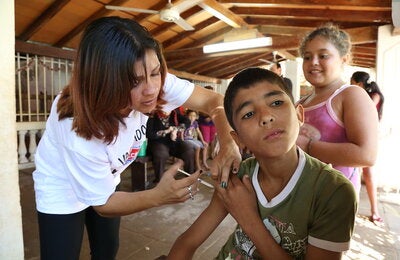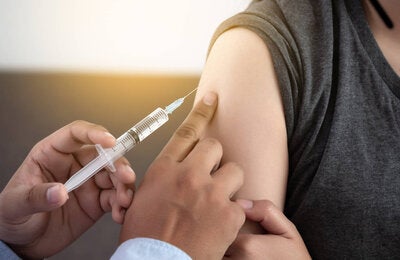
 Haiti's top government official for women's issues—minister of Women's Affairs Marjorie Michel—visited Washington, D.C., this week to seek new support for efforts to address the special health needs of women following the January 12 earthquake.
Haiti's top government official for women's issues—minister of Women's Affairs Marjorie Michel—visited Washington, D.C., this week to seek new support for efforts to address the special health needs of women following the January 12 earthquake.Post-quake problems range from sexual violence to lack of obstetric services
 Washington, D.C., Feb. 26, 2010 (PAHO) -
Haiti's top government official for women's issues visited Washington,
D.C., this week to seek new support for efforts to address the special
health needs of women following the January 12 earthquake.
Washington, D.C., Feb. 26, 2010 (PAHO) -
Haiti's top government official for women's issues visited Washington,
D.C., this week to seek new support for efforts to address the special
health needs of women following the January 12 earthquake.
Minister of Women's Affairs Marjorie Michel told officials at the Pan American Health Organization/World Health Organization (PAHO/WHO) on Thursday that women and girls in Haiti face special problems ranging from incidents of rape and sexual exploitation to shortages of food and lack of access to basic obstetric services.
PAHO Assistant Director Dr. Socorro Gross pledged that PAHO would work with other agencies to better address these unique challenges. "There are special needs for women in Haiti, and these needs are urgent."
Michel noted that a number of institutions that addressed women's needs prior to the quake were destroyed or crippled, leaving women without access to skilled medical attention during childbirth, for example, or with little protection from sexual exploitation.

PAHO Assistant Director Dr. Socorro Gross & Hon. Marjoire Michel, Minister of the Female Conditions and Right of Women Haiti
She noted that Haitian women and girls were already subject to high rates of sexual violence, and the earthquake has now increased their vulnerability. She added that Haitian women and girls are often hesitant to report rapes because of the risk of stigmatization or possible retaliation. In other cases, women may consent to sexual exploitation in exchange for protection. This is especially true of those who have been left homeless or who have lost family members in the quake. Michel said interviews with migrant girls indicate that many of them left Port-au-Prince in the aftermath of the quake precisely to escape these risks.
While there are no good data available, health workers say that sexually transmitted infections have increased among girls since the quake, Michel noted.
To address these problems, Michel's ministry is supporting and training "brigades" to help prevent violence in tent communities and to help women who have been raped or who need reproductive care to get the appropriate services.
Michel noted that psychosocial support is also important, particularly for women who suffered permanent injuries during the quake as well as for women who are caring for disabled family members or who otherwise must shoulder the burden of caring for others under adverse conditions.
Michel also made a general appeal for better coordination of relief efforts and greater respect for Haitians' leadership in the reconstruction of their country.
PAHO this week dispatched a specialist on gender issues to Haiti to work with the PAHO-led Health Cluster to ensure that women's special needs are being addressed by agencies providing health-related relief.
PAHO was established in 1902 and is the world's oldest public health organization. It works with all the countries of the Americas to improve the health and quality of life of the people of the Americas and serves as the Regional Office for the Americas of the World Health Organization (WHO).
CONTACTS: Donna Eberwine-Villagran, email: eberwind@paho.org,
tel. +1 202 974 3122, Knowledge Management and Communication Area, PAHO/WHO — http://www.paho.org/
LINKS
Donate to Haiti Earthquake Relief:
www.pahef.org/haiti
Are Haitian Women and Children Getting Less Earthquake Aid?
PAHO Emergency Preparedness and Disaster Relief
www.paho.org/disasters
OCHA
Web page on Haiti
https://twitter.com/pahoeoc
https://www.youtube.com/pahopin
https://www.facebook.com/PAHOWHO
https://twitter.com/pahowho



